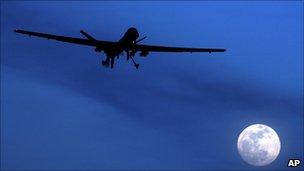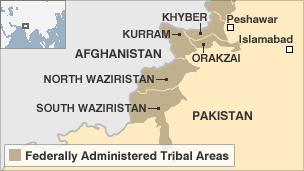Taliban 'remove German militants' bodies' after attack
- Published

US drone attacks have increased in the past month
The Taliban have removed the bodies of eight militants killed in a US drone attack in Pakistan, the BBC has been told.
Pakistani security officials say that four of the dead were German nationals.
They were killed by two missiles fired at a house in North Waziristan. A number of people were said to have been wounded.
Security sources have closely linked the area to a reported al-Qaeda plot to attack European cities.
The attack destroyed the home of a tribal leader with close links to a local Taliban commander in a village 3km (2 miles) from the main town of Mir Ali.
Identification of the victims is being made more difficult because Taliban militants sealed off the area after the missile strike, taking away the remains for burial.
A number of people were said to have been wounded.
Hamburg Islamists
Security officials have told the BBC that the German nationals were in close contact with Pakistani Taliban supreme commander Hakimullah Mehsud.
The officials said the Germans had been part of an al-Qaeda-allied band of foreign fighters allied to Mr Mehsud's group.
Local tribesmen told the BBC that the Germans had been spotted in Mr Mehsud's company in the area.
There have been concerns about the presence of German nationals in Pakistan's tribal areas.
According to German media, several Islamist militants disappeared from their homes in Hamburg in 2009 and were thought to have headed for North Waziristan.
The arrest of one of those militants, Ahmed Sidiqi, in Afghanistan in July is said to have yielded useful intelligence to investigators.
The previous month, German media reported that a 25-year-old German of Syrian origin, considered to be head of the Hamburg group, had been arrested in Pakistan.
On Monday, the German interior ministry revealed that 70 Germans had been given paramilitary training in Afghanistan and Pakistan, and a third of them had returned home.
In August, German police shut down a mosque in Hamburg which had been used by the 9/11 attackers and which the authorities believed was again becoming a focus for extremists.
Berlin, as well as Paris and London, was cited in a US warning at the weekend as a possible target for a suspected al-Qaeda plot.
Several countries have issued travel warnings to their citizens, saying they should be vigilant while travelling in Europe.
The increase in US drone strikes in the month of September has been due in part to the terror plot, but has not been the sole reason for the increase, a senior Western official told the BBC in Washington.
In Pakistan, the US has carried out 26 drone strikes in the past month - the highest monthly total for the past six years.
Militant shelter
Pakistan's ambassador to the US, Hussein Haqqani: "European, Pakistani and American intelligence services are working together to foil these plots"
The militants killed on Monday were apparently visiting tribal leader Sher Mullah, who has close links to Hafiz Gul Bahadur, the local Taliban chief.
The area around Mir Ali has been known to harbour militants from a number of foreign countries in the past.
Tahir Yuldashev, leader of the Islamic Movement of Uzbekistan, was based there along with many of his comrades for a number of years.
As well as German nationals, Dutch and French citizens have been arrested by security forces in the nearby Bannu area.
British-born Rashid Rauf, who was implicated in a plot to blow up transatlantic airliners, was said to have been killed there in November 2008.
Drone attacks
The CIA began their drone attacks several years ago, as they believed the Pakistani military was doing little to combat the threat from militants in the region.
Western intelligence officials believe the missiles have severely restricted the ability of al-Qaeda to carry out major attacks.

More than 150 people have died in drone strikes this year, including both militants and civilians.
Al-Qaeda's operations chief is believed to have been one of those killed in recent drone strikes.
The attacks have inflamed public opinion in Pakistan, which last week was further aggravated by border violations by Nato helicopters from Afghanistan.
Pakistan's government has subsequently clamped down on the supply of goods and fuel from Pakistan to Nato troops based in Afghanistan.
- Published5 October 2010
- Published5 October 2010
- Published5 October 2010